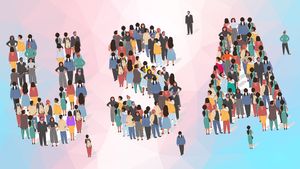Treatment GuideJust DiagnosedSex & DatingAfrican AmericanStigmaAsk the HIV DocPrEP En EspañolNewsVoicesPrint IssueVideoOut 100
CONTACTCAREER OPPORTUNITIESADVERTISE WITH USPRIVACY POLICYPRIVACY PREFERENCESTERMS OF USELEGAL NOTICE
© 2025 Pride Publishing Inc.
All Rights reserved
All Rights reserved
Scroll To Top
By continuing to use our site, you agree to our Privacy Policy and Terms of Use.
Simply teaching people the facts about how to protect themselves from HIV may not be enough to prevent the spread of the virus in Africa, a new study suggests.
Researchers found that villagers in Ghana who had higher levels of cognitive and decision-making abilities - not just the most knowledge - were the ones who were most likely to take steps to protect themselves from HIV infection.
These cognitive abilities are what people develop through formal education, says Ellen Peters, lead author of the study and associate professor of psychology at Ohio State University. "Knowledge about HIV and AIDS is important," she says, "but greater knowledge is not by itself leading people to take on healthier behaviors. People really need the education that trains them how to think, to use their knowledge to plan for the future."
This is one of the first studies to show the importance of formal education in helping to prevent the spread of HIV, outside of research done in relatively well-educated Western countries, Peters says.
The study appears online in the journal Psychological Science and will be published in a future print edition.
Rural Ghana is a good place to study the effect of education on health behaviors because citizens there have nearly equal access to health care and nearly equal levels of wealth, but there are wide differences in education levels, according to Peters and David Baker, coinvestigator of the study and professor of education and sociology at Penn State University.
This study involved 181 residents of eastern Ghana who lived in four small, agrarian villages with little migration into or out of villages.
The villagers participated in the study in exchange for a bucket, a bar of soap, and a roll of toilet paper. Participants had an average of 6.6 years of formal education.
The researchers tested villagers' working memory, math skills, and decision-making abilities - some of the cognitive skills associated with formal education. They were also given a test of their knowledge about HIV and how to protect themselves.
Finally, the researchers scored each participant on how much he or she used behaviors that reduced the risk of getting HIV, such as using condoms.
Results showed that once participants' cognitive and decision-making abilities were taken into account, knowledge about HIV no longer predicted whether a person adopted protective behaviors. "We found," Peter says, "that the value of education wasn't so much in teaching facts but in teaching people how to think."
Peters gives an example from the study: One participant correctly answered a question by saying that HIV can be transmitted by blood transfusions. But when he was asked how he could minimize that risk, he responded by saying he couldn't get HIV from a transfusion if he wore a condom.
"He had some of the right facts," Peters says, "but he was using that knowledge inappropriately, in a way that could ultimately harm him. That's where cognitive and decision-making abilities could have helped him to use the facts to make the better choices."
The results have important implications for fighting AIDS in Africa and other parts of the world that have large numbers of uneducated people, Peters says.
About $8.9 billion has been spent on HIV prevention in Ghana and the surrounding region since 2000, primarily through disseminating facts about the disease. But the effectiveness of these programs has never been adequately studied.
"Our findings suggest that those efforts, however well intentioned they may be, may not be sufficient without efforts to help at-risk adults to reason correctly with the facts they have been taught," she explains. "Given that sub-Saharan Africa is home to both the largest unschooled population in the world and the largest HIV-infected population in the world, we need to better understand how to design effective HIV-prevention programs."
Peters notes that, although this study looked specifically at HIV prevention, it is likely that more education could help people in a variety of ways. "We hope the results of our study will stimulate examination of the costs and benefits of spreading basic education worldwide," she says. "Education helps people reason flexibly across many different areas of life and make decisions that will help them prepare for the future."
From our Sponsors
Most Popular
Grindr is reminding us why jockstraps are so sexy and iconic
May 02 2025 5:36 PM
BREAKING NEWS: Trump admin moves to end federal HIV prevention programs
March 18 2025 6:10 PM
BREAKING: Supreme Court rules to save free access to preventive care, including PrEP
June 27 2025 10:32 AM
Discover the power of Wellness in your life
March 26 2025 12:41 PM
Plus: Featured Video
Latest Stories
The Talk: Navigating your treatment
August 01 2025 6:02 PM
How the Black AIDS Institute continues to fill in the gaps
July 25 2025 1:06 PM
Two right-wing Supreme Court justices signal they may uphold access to PrEP and more
April 21 2025 4:10 PM
Broadway's best raise over $1 million for LGBTQ+ and HIV causes
April 03 2025 7:15 PM
The lab coat just got queer
August 21 2025 10:00 AM
Messenger RNA could be the key to an HIV vaccine — but government cuts pose a threat
August 20 2025 8:02 AM
The Talk: Starting the conversation
July 25 2025 4:47 PM
“I felt like a butterfly”: Niko Flowers on reclaiming life with HIV
July 23 2025 12:22 PM
1985: the year the AIDS crisis finally broke through the silence
June 26 2025 11:24 AM
Trump admin guts $258 million in funding for HIV vaccine research
June 03 2025 3:47 PM
The Talk: Beyond the exam room
August 13 2025 3:15 PM
Thanks to U=U, HIV-positive people can live long, happy, healthy lives
July 25 2025 2:37 PM
Dancer. Healer. Survivor. DéShaun Armbrister is all of the above
July 02 2025 8:23 PM
VIDEO: A man living with HIV discusses his journey to fatherhood
June 10 2025 4:58 PM
HRC holds 'die-in' to protest Trump health care cuts
April 28 2025 2:11 PM
500,000 Children at Risk: PEPFAR Funding Crisis
April 08 2025 3:51 PM


































































